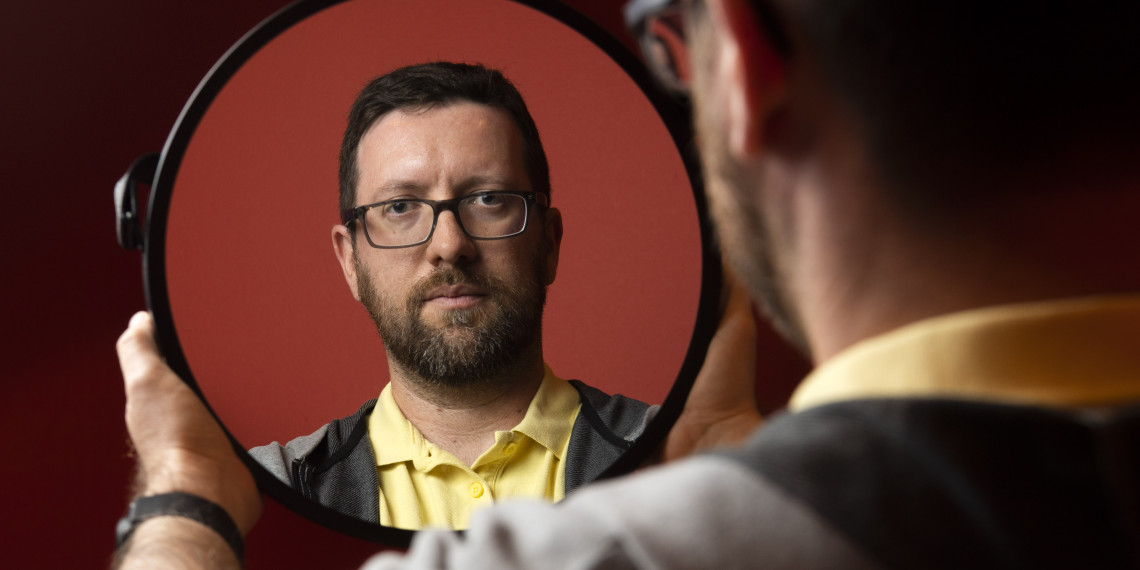‘I want my work to make people miserable’, says Nolen Gertz, and he means it. Such is the task of a philosopher. And this particular UT employee is a philosopher, not a scientist. ‘No, I don’t identify as a scientist’, he stresses. ‘I always tell my students: Philosophy isn’t something you study. It’s more of a psychological disorder that you’re born with. You can’t help to be like that. It means having so many questions that it drives you crazy and leads to the inability to live like a normal person.’
For the Assistant Professor, philosophy is indeed (a way of) life, but it wasn’t until his freshman year in college in Washington DC that he realized how drawn he was to it. All thanks to a bad grade. While still contemplating a career as a politician, young Nolen did very badly on his first exam in a politics course. He was shocked and soon realized that he missed one full question. He was determined to retake the exam and pleaded with his professor and his classmates. ‘My professor got really angry with me’, recalls Gertz. ‘But eventually, he told me that I could read this book and report on it as a redo assignment. The book was ‘Ludwig Wittgenstein: The Duty of Genius’ by Ray Monk. I found it incredibly inspiring, so it turned out the professor knew what he was doing. Essentially, he took me under his wing and told me what to do with the rest of my life.’ Even so, Gertz didn’t decide to study philosophy straight away. He went to study journalism but kept taking philosophy classes on the side. ‘I took so many of the classes that the school eventually told me to switch my master’s fully to philosophy. So I did.’
Nolen Gertz’s career in a nutshell
2019 Published author of book ‘Nihilism’
2018 Published author of book ‘Nihilism and Technology’
2015-present Assistant Professor of Applied Philosophy at the University of Twente and the Coordinator of the 4TU.Centre for Ethics and Technology's Taskforce on Risk, Safety, and Security
2014-2015 Visiting Assistant Professor, Pacific Lutheran University (USA)
2014 Published author of book ‘The Philosophy of War and Exile’
2012-2014 Instructor of Philosophy, Delta College (USA)
2012 PhD in Philosophy from The New School for Social Research, New York City (USA)
Two decades later, here we are. ‘I’m very happy and honoured that I can do what I do’, says Gertz, author of several books and Assistant Professor of Applied Philosophy at the UT. ‘You can’t really be a ‘practicing’ philosopher outside of academia. If you want to be paid to be a philosopher, you have to be a professor.’ He feels that his work vastly differs from the one of his colleagues from other (research) fields, though. ‘Philosophy is about the meaning of life and how we should live, not about improving some widget. It’s all about why, not how. Philosophy and academia are intertwined, but they are certainly not the same thing.’
‘A scientist is someone who has integrity by definition’
As a philosopher working at a technical university, Nolen Gertz does bring the two closer together. ‘I’m often asked to teach courses on scientific integrity. Integrity is about withstanding pressure – which can be financial pressure, pressure to come up with results, pressure to follow certain rules. A scientist is someone who has integrity by definition. A scientist is someone who is truth seeking and doesn’t put themselves above the field. A scientist would never commit fraud. If you do commit fraud, you are not a bad scientist. You are simply not a scientist at all. It’s the same as if a doctor was operating on you with a chainsaw instead of a scalpel. You wouldn’t say he is a bad doctor. You would say he is not a doctor.’
Apply for grants or perish
Although ethics and integrity are generally considered an essential part of academia, ethicists don’t always thrive in the academic environment, believes Gertz. ‘Philosophy created academia. I only wish academia remembered that’, he remarks. ‘Just think of grant applications. Grant applications are designed for scientists, not philosophers. They put a lot of focus on the type of equipment you want to use, on the methodology that you hope to perfect. I feel embarrassed to ask for one and half million euros to do philosophy. I have done so several times, but I was almost relieved when I didn’t get it. I have applied for grants because that is the expectation in academia. You need to do that in order to get promoted. You need PhDs to do research and the only way to get them is to receive grants. It’s not only ‘publish or perish’, but also ‘apply for grants or perish’. I’m not asking for the money for me. I see it as money to pay for PhDs and give them the opportunity to work on their own research.’
‘I feel embarrassed to ask for one and half million euros to do philosophy’
‘In academia, we are trying to fit everyone into the same mold’, continues the UT researcher. ‘We tell them how many percent of their work they should spend on teaching, research, administration… and then there is this big new word: impact. We should make an impact, but nobody really knows what it means. To me it seems like another way of saying ‘grant money’. Impact is hard to quantify, unless you are able to say: ‘I got a grant worth one million euros and will hire five PhDs’. I even discussed this ‘impact’ with our dean, and she said: well, impact is if your work makes people happy. Does your work make people happy? I said: No! My work is about making people miserable.’

Because only by accepting the true state of the world, and therefore feeling miserable, can we hope to improve the world, explains the philosopher. ‘I have written a lot about nihilism. A nihilist is stereotypically seen as an angry teenager that is really into goth music. But in my eyes, a nihilist is someone who tries to be happy in a world where you shouldn’t be happy. Because ignoring what is happening – climate change, war, poverty… – doesn’t make the world a better place. Nihilism is about the unwillingness to face reality and the desire to escape reality. I try to fight nihilism, not to promote it.’
Nolen Gertz’s research in a nutshell
Nolen Gertz’s research focuses primarily on the intersection of political philosophy, existential phenomenology, and philosophy of technology. His doctoral dissertation was a criticism of Just War Theory, arguing that JWT’s common morality perspective is both unrealistic and a contributor to combatant suffering. He is the author of several books on nihilism, in which he links nihilism to escapism and warns of its dangers. He has written for the media analyses of military robots, humanitarian drones, and Facebook. His work has appeared in The Atlantic, The Washington Post, and on the ABC Australia website.
While nihilism and its connection to technology has been the focus of Gertz’s work in the past, he is now shifting his attention to politics of design. ‘In my previous work, I was essentially telling people that what they were developing was wrong’, he says. ‘When they asked me how to fix it, I’d have to reply: ‘I’m only here to tell you what you are doing is wrong, not to fix it.’ But I realized that was not a good enough answer, and lately I’ve been looking into how to fix it.’
Freedom
In his work, Gertz is using the concept of Ambiguity, referring to the idea that humans are simultaneously a mind and a body. ‘It means that we are free and also capable of being oppressed. Having a free mind doesn’t mean that we are free. Your bodily being shapes your existence’, explains the Assistant Professor. ‘I’m using this concept in design because people often put their freedom above societal needs. Designers try to work around that, for example by using gamification. If, let’s say, they want people to recycle, they come up with a rewards system – if you recycle, you earn points and can win something. People then might recycle more, but I worry that it doesn’t have a lasting effect. It can even be counterproductive. Because by using this approach, you didn’t get people concerned about the environment, you got them concerned about earning points.’
‘I try to contribute better questions’
Questions. That is Nolen Gertz’s main contribution, he says when asked about how his work makes the world a better place. ‘Philosophy is not about answers, but about questions. I try to contribute better questions. Questions such as: why do we think it’s okay to spend the whole weekend binge-watching shows on Netflix? Why do we think it’s normal to stare into our phones, put on headphones and create a digital bubble whenever we are in public? I want people to ask questions – and that is how I make them miserable.’
‘I like working in science’, says Nolen Gertz despite all the talk of ‘misery’. ‘It’s an honour to do what I do, and I realize how easily it could have gone differently. I’m often very vocal and critical, but I don’t see that as a sign of disrespect. For me, it is a sign of being engaged – and I try to be more and more engaged. I have joined many boards and committees. I voice my concerns. I try to have impact.’







